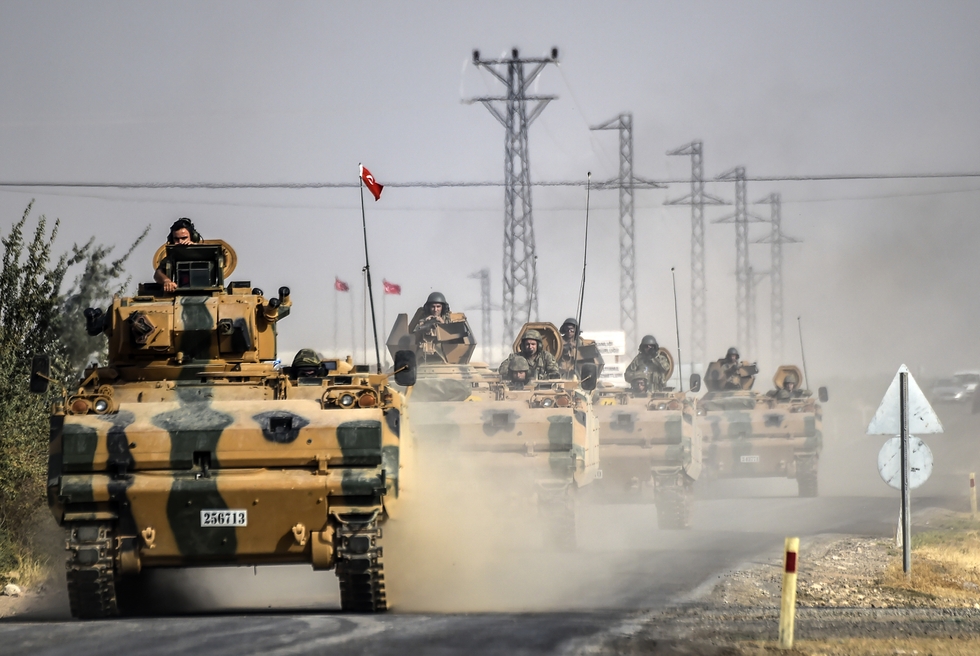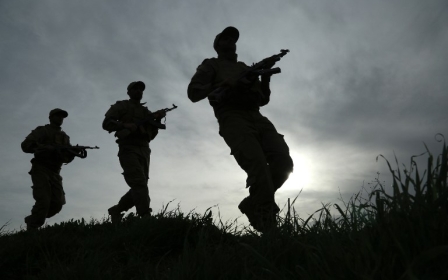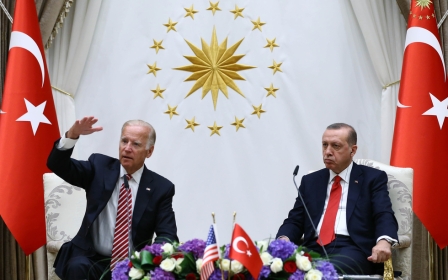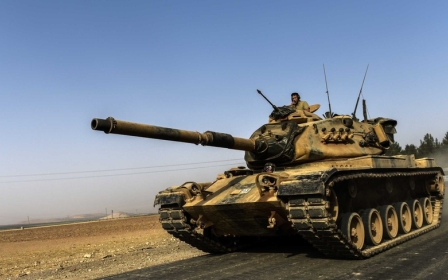Kurdish forces deny retreat across Euphrates, as Turkish tanks roll in

The pro-Kurdish People’s Protection Units (YPG) rebuffed on Wednesday previous reports that they were planning to withdraw their forces from west of the Euphrates river, following warnings from the US that they would stop supporting the militia if they did not do so.
“[The] Turkish state cannot shape our position there in accordance with its own interests. Our forces will remain there and there will be no retreat,” said YPG spokesperson Redur Xelil, speaking to the Voice of America radio on Wednesday evening.
“Nobody has the right to impose YPG's withdrawal from there and we will never accept such a thing."
The announcement comes after Turkish forces invaded northern Syria on Wednesday, with the aim of clearing the city of Jarablus from Islamic State forces, but also with the stated intention of challenging the YPG.
On Wednesday, speaking at a press conference in Turkey alongside Prime Minister Binali Yildirim, US Vice President Joe Biden said that the YPG would lose US support if they continued to spread westwards across the Euphrates river.
Following the comments, a YPG spokesperson appeared to indicate that they would comply with the US request and withdraw, although they also stated that the Kurdish-Arab Syrian Democratic Forces (SDF), of which the YPG is a component, would remain.
However, Xelil appeared to later contradict this.
“We are in the west of Euphrates and take our place within Syrian Democratic Forces,” he explained.
"We are in our own land and we will not leave it as per some request. We will not act in line with the request of Turkey or some other power.”
Despite Xelil’s comments, a spokesperson for the US-led coalition on Thursday announced via Twitter that the “main element” of the SDF forces in Manbij, which was liberated from IS by the organisation in early August, would be moving eastwards across the Euphrates:
On Wednesday, Free Syrian Army forces backed up by the Turkish military took control of the city of Jarablus from IS.
Photos released on social media appeared to show a deserted city spotted with IS flags which fell without much fighting.
Meanwhile Turkish media reported Turkish artillery strikes on Thursday evening against a group of YPG soldiers just south of the captured town of Jarablus. The state-run news agency Anadolu called it warning shots against any sort of PYD adventure west of the Euphrates.
A Turkish official said on Wednesday that Ankara would "continue operations until we are convinced that imminent threats against the country's national security have been neutralised,” according to AFP.
Another official told Reuters there are now more than 20 Turkish tanks inside Syria and that more would be sent as required.
“We need construction machinery to open up roads … and we may need more in the days ahead,” the official said on condition of anonymity. “We also have armoured personnel carriers that could be used on the Syrian side. We may put them into service as needed.”
Abdulkadir Selvi, a columnist for Turkish daily Hurriyet, said Turkey’s aims in Syria included creating a security zone free of "terror groups" and limiting the advances of Kurdish militia.
He added that the number of Turkish troops involved in the offensive, currently 450, could rise as high as 15,000.
Hurriyet said that around 100 IS militants had so far been killed in the fighting, though this could not be independently verified.
State-run news agency Anadolu said one rebel fighter was killed and that the Turkish armed forces sustained no losses.
Ankara has been keen to emphasise the offensive was not targeting Syria’s territorial integrity.
Jarablus is the last major town in the hands of IS along the border with Turkey.
Turkey views the YPG and its political wing the Democratic Union Party (PYD) as being an offshoot of the Kurdistan Workers Party (PKK) who have been engaged in a long-running guerilla war with the Turkish state.
Russia, which is backing the Syrian government of President Bashar al-Assad, said it was "deeply concerned at what is happening in the Syrian-Turkish border area".
Turkey's air and ground operation risks "further degeneration of the situation in the conflict zone," Moscow warned.
And despite backing Turkey in Syria, Biden refused to budge on stated policy over the extradition of Fethullah Gulen, a preacher in self-exile in the US who is blamed by Ankara for the failed coup in July.
The US state department on Tuesday confirmed it had received a formal extradition request from Turkey.
Biden on Wednesday said it was for the courts to decide and that US officials were cooperating with Turkish counterparts to ensure paperwork met US legal standards.
New MEE newsletter: Jerusalem Dispatch
Sign up to get the latest insights and analysis on Israel-Palestine, alongside Turkey Unpacked and other MEE newsletters
Middle East Eye delivers independent and unrivalled coverage and analysis of the Middle East, North Africa and beyond. To learn more about republishing this content and the associated fees, please fill out this form. More about MEE can be found here.




